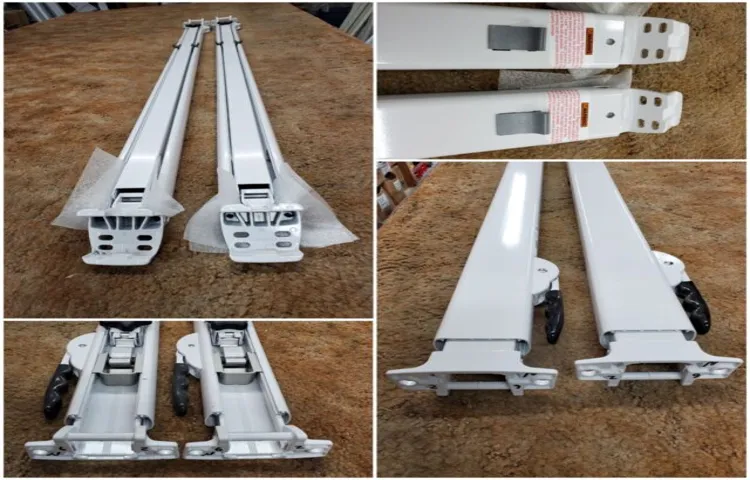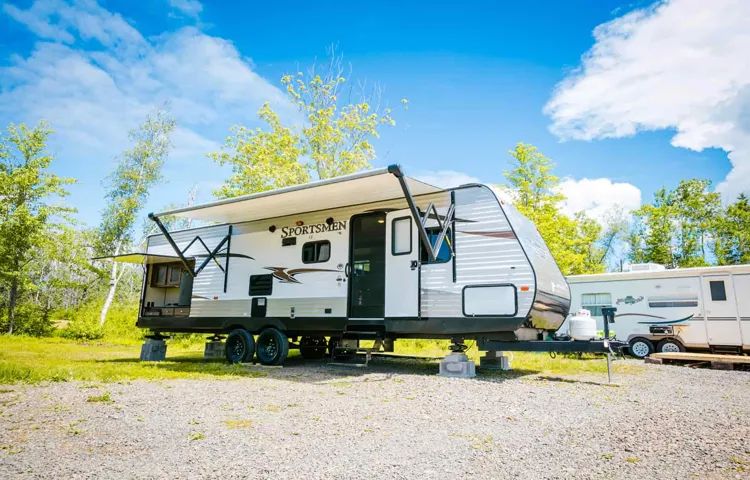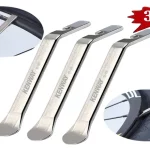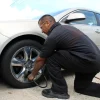If you’re a proud owner of an RV, you know the importance of taking care of your investment. One of the most important components of your RV is undoubtedly the awning. Not only does it provide shade and shelter for you and your family, but it can also enhance the aesthetic appeal of your home away from home.
However, before you can hit the road and enjoy your RV, you need to know how to release your awning properly. In this blog, we’ll walk you through the steps to take to release your RV awning safely and efficiently, so you can enjoy your travels worry-free. So grab a cup of coffee and let’s get started!
Table of Contents
Check the Awning Lock
If you’ve ever struggled with releasing an awning on your RV, it’s important to check the awning lock first. The lock will prevent the awning from accidentally opening while driving and causing damage. To release the awning, you’ll need to locate the lock and ensure it’s in the unlocked position.
This can typically be done with a simple switch or knob. Once you’ve unlocked the awning, you can gently pull it out to the desired length and lock it into place once again. Remember to always double-check that the lock is secure before driving off to prevent any unnecessary accidents.
Now, next time your RV awning seems stuck, remember to check the lock and release it if necessary.
Ensure the RV is Levelled
When you’re out camping in your RV, the last thing you want is to be on uneven ground! Setting up camp on uneven terrain can lead to numerous problems – your RV appliances may not work properly, the doors may not close, or you may find yourself waking up to a bad case of motion sickness! It’s important to ensure that your RV is levelled before you settle in for the night. By doing so, you’ll ensure a more comfortable and stress-free experience. One way to achieve the perfect level for your RV is by using levelling blocks.
These blocks can be placed underneath your tires to help you adjust the height of your RV. Once you’re happy with the level, it’s time to check the awning lock. The awning is a roof-like structure attached to the RV that provides shade and shelter from the elements.
Before use, you’ll need to ensure that the awning is securely locked in place, or you may find yourself dealing with a collapsed structure in the middle of a storm! As you set up your awning, you’ll want to double-check that the locking mechanism is correctly engaged. After all, the awning is there to protect you and your family from the sun, wind, and rain. Without a properly locked awning, you could find yourself in a pickle! To check if the awning is locked, you’ll need to give it a gentle tug.
If it holds firm, you’re good to go! However, if it’s loose or gives way, you’ll need to re-engage the lock. A collapsed awning can cause damage to your RV, and worse yet, can be deadly. So always double-check your locks before settling in for the night! Remember, the key to a successful camping experience is preparation.
By ensuring that your RV is levelled and your awning is securely locked, you’ll be well on your way to having an enjoyable and memorable trip.

Look for the Release Latch
When it comes to using an awning, it’s important to make sure it’s secure and won’t unexpectedly collapse. One of the first things to check is the awning lock. Make sure it’s fully engaged and holding the awning in place.
Sometimes, it can be tricky to tell if the lock is working or not, especially if you’re new to using an awning. If you’re having trouble, look for the release latch. This little button or lever can often be found near the lock mechanism and will disengage the lock when pressed.
It’s also a good idea to regularly clean and lubricate the lock mechanism to make sure it stays in good shape. Don’t forget that safety is key when it comes to using an awning, so always double-check before settling into your outdoor area.
Open the Awning
If you’re looking to enjoy some shade and shelter from the sun while camping, then opening your RV awning is a must. The process of releasing the awning on an RV may seem daunting, but it’s actually quite simple. Firstly, ensure that the awning is unlocked by turning the release knob counterclockwise.
Then, slowly pull the awning outwards from the RV using the strap until it’s fully extended. To further secure the awning, extend the support legs, and position them firmly on the ground. Finally, adjust the pitch of the awning by using the adjustable arm to ensure rainwater drains away efficiently.
With these simple steps, you can quickly and easily release your awning, giving you a comfortable space to relax and unwind outside your RV.
Release any Brackets or Straps
When it comes to opening your awning, the first step is to release any brackets or straps that may be holding it in place. This can vary depending on the type of awning you have, but typically there will be straps or hooks that need to be undone. Once these are released, it’s time to actually open the awning.
This is a fairly simple process, but it’s important to do it correctly to avoid any damage. Start by gently pulling the awning outwards, being careful not to tug too hard on any of the parts. You may need to use both hands to do this, especially if your awning is large.
As you pull, you should start to see the awning unfolding, revealing the full length of the fabric. If your awning has a motor, you can also use this to help open it up. Simply press the button or switch and let the motor do the work for you.
Overall, opening your awning is a relatively easy process if you take your time and follow the instructions carefully.
Pull Out the Awning
When it’s time for relaxation and unwinding outdoors, opening your awning can make a world of difference. It’s a simple process that yields fantastic results. First, locate the pull-out mechanism and give it a gentle tug.
As you do so, you’ll notice the fabric begins to unfurl and stretch outwards. Slowly and carefully, continue to pull the awning out until it reaches its fullest extension. Now, you’re ready to enjoy the cool shade and a respite from the sun’s rays.
With your awning open, it’s time to relax, sip your favorite refreshments, and soak up the view of nature. From now on, opening your awning will remind you that it’s time to kick back and enjoy life’s simple pleasures.
Set the Awning Legs
When it comes to setting up your awning, it’s important to open it up properly for maximum stability and comfort. First, make sure the ground where the awning will be set up is level and clear of any debris. Then, release the awning arms and slowly roll out the awning fabric until it’s fully extended.
Next, it’s time to set the awning legs. Take one leg at a time and adjust it to the desired height, making sure it’s firmly in place before moving on to the next one. This will ensure that your awning is level and won’t wobble or shift during use.
Make sure to double-check all the legs before attaching any additional accessories or equipment. By taking a few extra minutes to properly set up your awning, you can ensure a comfortable and stress-free outdoor experience. So, why not take advantage of your outdoor space and create a cozy, shaded area for you and your loved ones to enjoy?
Closing Your Awning
Have you ever had trouble releasing the awning on your RV? It can be a tricky process, but with a few simple steps, you’ll be able to close it up in no time. First, make sure any straps or ties holding the awning in place are removed. Next, locate the release mechanism on your awning, usually found near the end of the roller tube.
It may be a button or lever that needs to be pushed or pulled, depending on the type of awning you have. Once you’ve activated the release, slowly roll the awning back up. Be sure to double-check that it’s securely fastened before hitting the road.
By following these steps, you can release your awning on your RV with ease.
Retract the Awning
When the weather starts to turn cooler, it’s important to close your awning properly to protect it from damage. Before starting, inspect the awning for any signs of wear or tear, and make any necessary repairs. Then, begin by retracting the supporting arms and guides, making sure they are fully locked into place.
Next, use the crank to roll up the awning fabric, being careful not to bunch or twist it in the process. Once fully retracted, secure the awning to prevent it from unrolling during windy conditions. Remember, proper care and maintenance of your awning will ensure it lasts for many seasons to come.
So take the time to close it properly and enjoy the benefits of an awning for years to come.
Secure the Brackets and Straps with the Latch Closed
When it comes to closing your awning, it’s important to make sure that you secure the brackets and straps with the latch closed. This will ensure that your awning stays in place even in windy conditions. Begin by pulling the awning fabric back toward the roller tube until it is fully retracted.
Then, lock the latch in place. Next, secure the brackets and straps tightly around the roller tube. You may need to adjust them slightly to ensure a snug fit.
Finally, double-check that everything is secure before leaving your awning unattended. By following these simple steps, you can rest assured that your awning will stay safely in place, no matter what the weather may bring.
Final Thoughts
Releasing an awning on an RV may seem like a daunting task for beginners, but with a little practice, it can become second nature. The first step is to locate the awning’s locking mechanism, which is typically found on the side of the RV. Push the release button or lever, and the awning should begin to extend.
Be sure to keep a firm grip on the awning support arm as it extends, as this will help prevent any accidents. Once the awning is fully extended, lock it into place using the designated locking mechanism. This ensures that the awning stays securely in place, even on windy days.
When it’s time to retract the awning, simply unlock the mechanism and use the support arm to pull it back in. Remember to take your time and be gentle with the awning to avoid causing any damage. With these steps in mind, you’ll have no problem releasing and retracting your RV’s awning like a pro.
Conclusion
Congratulations, you now know how to release the awning on your RV! With these simple steps, you can bask in the shade or soak up the sun to your heart’s content. So go forth, adventurer, and enjoy the great outdoors in style and comfort. And remember, the only thing better than a functional awning is a clever pun about it – you’ve got it made in the shade!”
FAQs
What is an RV awning and how does it work?
An RV awning is a retractable roof made of canvas or vinyl that extends and retracts over an outdoor living area of an RV. To release the awning on an RV, unlock the latch and pull the lever to lower the awning.
How do I maintain my RV awning?
To maintain your RV awning, keep it clean by brushing off any debris and dirt regularly. Lubricate the moving parts of the awning with silicone spray to prevent corrosion and wear and tear. Make sure to secure the awning in windy conditions to prevent damage.
Can I repair my RV awning myself?
Yes, you can repair some minor damages to your RV awning, such as tears or holes, using a patch kit or tools. However, if the damage is extensive, it is recommended to have a professional repair or replace the awning.
How do I adjust the pitch of my RV awning?
To adjust the pitch of your RV awning, loosen the knob holding the rafter arm and slide it up or down to your desired angle. Then, tighten the knob to secure the rafter arm.
What should I do if my RV awning won’t retract?
If your RV awning won’t retract, first check the power source and fuses. If those are not the issue, try manually retracting the awning using the hand crank. If you still cannot retract the awning, it may be a mechanical issue that requires professional repair.
How do I replace the fabric on my RV awning?
To replace the fabric on your RV awning, remove the old fabric and slide the new fabric in place. Make sure to properly align the fabric and secure it in place with the rafter arms and roller tube.
What should I do to winterize my RV awning?
To winterize your RV awning, clean and dry it thoroughly and store it in a dry, cool place. You may also want to use an awning cover to protect it from the winter elements. Remember to remove any debris or snow from the awning cover regularly to prevent damage.



